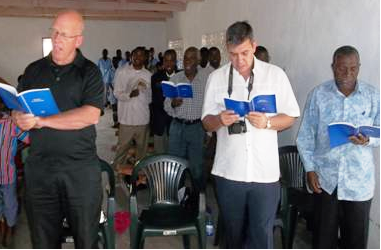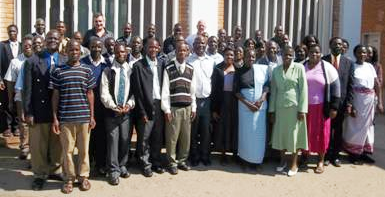Dear Brothers and Sisters in Christ, 
One of the problems with religious jargon is that it is often meaningless and sounds strange to people who are not “believers.” Another problem is that, after a while, some expressions become clichés and thus lose meaning to those who are believers.
For example, it is common to hear church-going people say things like “Jesus is in my life,” or “Jesus is my life.” But do they stop to ask themselves what, exactly, do those expressions mean? There is a subtle, but vital distinction between Jesus being “in” my life and Jesus “being” my life. Authentic Christianity is about becoming who Jesus created us to be. It is not a matter of prioritizing our life to make Jesus number one on our to-do list. The vital distinction is that he does not just come into our life; rather, he becomes our life. He has given us a new life in him.
I know we have all heard that. But how deeply do we understand it? As Paul wrote to the Galatians, “I have been crucified with Christ and I no longer live, but Christ lives in me. The life I now live in the body, I live by faith in the Son of God, who loved me and gave himself for me” (Galatians 2:20). As he explained to the Philippians, “It is God who works in you to will and to act in order to fulfill his good purpose” (Philippians 2:13). These are familiar scriptures, but, like clichés, they can become so familiar that they lose their impact. So let’s dig in a little and see if we can go deeper.
The typical understanding of the Christian religion is that it is a system of things to do and to believe in order to receive eternal life. However, that is not authentic Christianity. Authentic Christianity is not simply another religion.
Although most Christians agree that they are saved by grace, some think that they must maintain their salvation by their good works. It is as if Jesus “jump-starts” them, but then it is up to them to “stay saved.” But this misunderstanding completely misses the point about the nature of salvation and about our sanctification as well. Both are about our ongoing life “in Christ.” Both are about who Jesus is and the work he has done, is doing and will do to save and sanctify us completely. We are then invited to trust in and thus join in what he is doing.
Consider sanctification. Rather than being about our works, it is about our ongoing fellowship and communion with God, in Christ. It is about the ongoing reality that we belong to Christ. It involves making an integral part of our thinking the reality that “he belongs to me and I belong to him.” We have a bond that is far stronger than one based on “staying ahead of the game” through our good works.
As we awaken to this reality, we gain confidence that comes from the realization that we really do belong to Christ, body and soul. I get a glimpse of this when I reenter the United States after a trip abroad. There are two lines. One is for visitors, who have often had to go through a lengthy process to get their visas. The immigration officials are courteous, but they scrutinize every document and often conduct long interviews. It sometimes takes hours of anxious waiting and if everything is not 100% in order, the hapless visitors may find they are denied entry. If they are allowed in, they have to be careful to obey all the rules.
Sadly, that is the way many Christians feel about their relationship with God. As an American citizen, I do not have to go through all that. The line for citizens moves much faster. The immigration officer quickly scans my passport and welcomes me home. I have no anxiety. I belong.
That is the kind of relationship God offers us. However, because we seem to naturally gravitate towards legalism, the question arises, how then do we obey God? But can you see that, even by asking the question that way, the quality of the relationship is not being fully recognized? If my life truly is at one with Christ, I want to be involved in the things he is doing. And, equally important, as I learn about the things that he has no interest in, I don’t want to be involved in those things. Obedience, then, is a matter of staying in communion with Christ, living out the reality that, by the Spirit, we are joined together.
When we “do religion,” we always struggle to find the balance between rest and service. However, when we are authentic Christians, we do Christ’s work while we rest and trust in him.
God’s love flows from him, through us, to others. Another way of saying this is that Christianity involves both our being (who we are) and our doing. This is because we are a new creation in Christ. Paul explained it this way: “Therefore, if anyone is in Christ, he is a new creation; the old has gone, the new has come!” (2 Corinthians 5:17, NIV 1984).
The relationship we have with Jesus is nothing less than glorious. As we grow in understanding, expressions like “we were created through Christ,” or “God’s destiny for us is in Christ” no longer remain pious sounding religious clichés. They take on a powerful meaning as they describe a dynamic relationship in which we with Jesus are bonded together for eternity.
This is a level of authenticity that all Christians yearn for. But because it sounds too good to be true, many pull back and accept a lesser form of relationship that is based, at least in part, on their good behavior. They live as if they have only a conditional visa to the Kingdom of God. However, as Paul notes, “All who are led by God’s Spirit are God’s sons and daughters. You didn’t receive a spirit of slavery to lead you back again into fear, but you received a Spirit that shows you are adopted as his children. With this Spirit, we cry, ‘Abba, Father’” (Romans 8:14-15, Common English Bible).
In other words, we belong! And there is no need to settle for anything less.
With love, in Christ’s service,
Joseph Tkach










